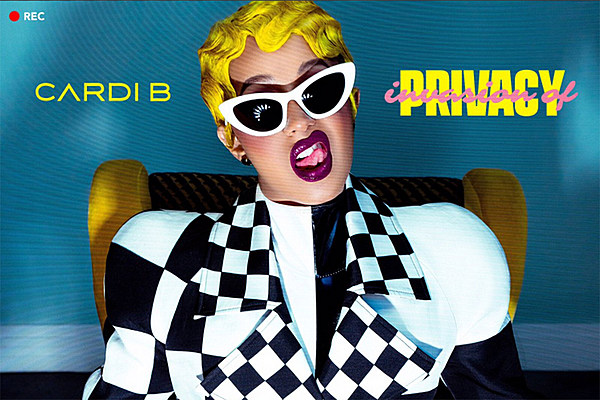Cardi B’s ‘Invasion of Privacy’ Proves Her Transparency Translates Into Triumph

In the final battle scene of the 2002 film 8 Mile, Eminem’s character B-Rabbit goes toe-to-toe with his antagonist Papa Doc, leader of the rival crew dubbed Free World. Instead of slinging insults at the character (played by Anthony Mackie), B-Rabbit’s disses are self-inflicted, leaving Papa Doc with no fodder for a rebuttal. Papa Doc stood there dumbfounded, the battle was over, and B-Rabbit was crowned king of the battleground.
It’s unknown if Cardi B had that iconic scene in mind when she opened her debut album Invasion Of Privacy, but strewing all of her cards on the table with her dynamic intro “Get Up 10” certainly left her haters in Papa Doc’s position. Cardi barks with ferocity, listing everything from her past as a stripper (“I said ‘dance’ not ‘fuck’/Don’t get it confused”), along with her breast implants (“Real bitch/Only thing fake is the boobs”) and any misconceptions and criticisms she’s endured thus far. Unveiling any potential critiques in the high-energy firestarter (sonically a nod to Meek Mill’s “Dreams and Nightmares”), she leaves the listener with only the ability to focus on her music—gossip blog clickbait to the side.
Upon its release, Invasion of Privacy had well surpassed the 500,000 sales mark, with an RIAA certified-gold stamp. It’s headed straight for the top spot on the Billboard 200—a testament to the speed of the rap-is-now-pop scene that the woman born Belcalis Almanzar not only inhabits, but practically owns at this exact moment. It’s a fact that continues to impress and annoy people, perhaps evenly. But with Invasion of Privacy, Cardi B proves she deserves her spot in hip-hop, perhaps more than most of her peers.
When Cardi B slid beneath the tattered velvet rope of Love & Hip Hop: New York fame and entered into the VIP section as her own person, her fate in the hip-hop world was still hanging in the balance. Her musical history was already in place, though not successfully locked, manifested in the form of one mixtape (2016’s Gangsta Bitch Music, Vol. 1) and a few loosies that erred on the side of shit-talky comedy rap (2015’s “Cheap Ass Weave” being the best of them, by far). She was a character named Cardi B at that point; her music career was merely the fashion line or fragrance line that any star had on the side.
Cardi departed from the LHH franchise at the close of 2016, dropped her second mixtape Gangsta Bitch Music, Vol. 2 a month later, and inked a deal with Atlantic Records a month after that. Her success was still uncertain. While one-half of the peanut gallery was praising her unbridled honesty through her social media and public persona, the other half was praying that her success story was circling the drain. Much to the latter’s chagrin, the exact opposite happened.
Her major label debut single “Bodak Yellow” kicked off what would become a whirlwind year for Cardi B. Already co-signed by most women in hip-hop (Remy Ma brought Cardi out on stage at Hot 97’s Summer Jam for a rap female posse performance in June within days of “Bodak Yellow’s” release), she was entering on somewhat neutral turf. Taylor Swift was sending her flowers after Cardi bumped her down the charts, Nicki Minaj was publicly congratulating her, award nominations were flowing in. Despite all of this and two successful cameos on G-Eazy’s “No Limit” and Migos’ “Motorsport” (coincidentally also featuring Nicki Minaj), there was still doubt. A fast-paced engagement to Offset, a Grammy nomination, a pregnancy rumor that later became a televised baby bump reveal via SNL, makeup-free social media snaps, interviews that made her even more beloved, and another single “Bartier Cardi” all showed she was bigger than one hit. It was now or never for Cardi B, the artist.
Invasion of Privacy is executed perfectly, playing to all of Cardi B’s strengths. Tracks like “Drip” with Migos and “She Bad” with YG bring the name recognition of peers with beats and hooks that can blare through car stereos or strip clubs. Her latest single “Be Careful” throws darts at an unfaithful lover, less jilted and more jolted, while “Ring” with Kehlani offers up a gentler take on Cardi B in love. The male-fueled use of “bitch” on “Thru Your Phone” still shows how Bardi is fucks-deficient. “Bickenhead,” “Money Bag,” and “I Do” with SZA are in the quintessential “Bitch, why you mad?” style that magnetized her audience with “Bodak Yellow.” “Best Life” with Chance The Rapper shows how despite her immunity to shade, she’s still very much tuned in (“Twitter with the backlash/#CardiBIsSoProblematic is the hashtag”). And while “I Like It” with Bad Bunny and J Balvin sounds like the sore thumb track on the project, the Caribbean-Latin fusion is the last touch added to a project that embodies every faction of Cardi B’s identity.
Back in 1996, both Lil’ Kim and Foxy Brown ignited a female sexual revolution in hip-hop thanks to their respective solo debut albums. The same can be said for Cardi in a sense, though in the age of social media her project more specifically silences naysayers while igniting an abundant and exciting time for women thriving in hip-hop.
An industry plant to some and the rap fairytale version of Pretty Woman to others, Cardi B had to jump through numerous hoops to earn her respect while other artists (see: male) can saunter into the space with simple SoundCloud streams. For this reason, Invasion Of Privacy sounds incredibly well thought-out. The beats were strategically chosen, the lyrics and hooks carefully constructed. Invasion Of Privacy was not slapped together, yet punches anyone in the face for doubting Cardi B. The odds were stacked against her, and she won. Now everyone wants to party with Cardi.
Check Out the 2018 Hip-Hop Music Festivals You Need to See
Go to Source
Author: Kathy Iandoli
Powered by WPeMatico


